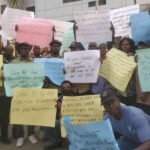The residents of Lagos State, southwest Nigeria, have continued to witness flooding in various parts of the state. This calls for concerted efforts from the state government.
Development Diaries reports that heavy rainfall early Wednesday, 03 July, 2024, led to flooding in many parts of Lagos State, making it difficult for commuters to move to their destinations.
Workers in the nation’s commercial hub struggle to get to their workplaces due to flooding whenever there is a downpour, as many remain stranded while trying to commute in the city.
According to a report from United Nations University titled Technical Report: Lagos floods – Interconnected Disaster Risks 2021/2022, around 90,000 inhabitants of Lagos are impacted by flooding annually.
Despite numerous promises and budget allocations, the Lagos State Government has repeatedly failed to address the persistent issue of flooding in the state effectively.
This ongoing challenge always disrupts residents’ daily lives every year and causes significant damage to property and infrastructure, endangering the lives of countless residents.
The state’s rapid urbanisation has worsened the problem, with inadequate drainage systems and poor waste management practices contributing to the frequent flooding of residential and commercial areas.
It is disheartening to see that, despite being a commercial hub, Lagos remains highly vulnerable to seasonal floods.
The government’s response to the flooding crisis has been largely reactive rather than proactive. Instead of implementing long-term, sustainable solutions, efforts have often been limited to short-term relief measures that do not address the root causes of the problem.
The absence of comprehensive urban planning and investment in resilient infrastructure has left the city ill-prepared to cope with heavy rainfall.
Furthermore, the lack of strict enforcement of building regulations and environmental laws has allowed unregulated development, which blocks natural waterways and worsens the flooding.
The human cost of this negligence cannot be overstated. Every rainy season brings with it the threat of displacement, economic loss, and health hazards for Lagosians.
Development Diaries calls on the Lagos State Commissioner for the Environment and Water Resources, Tokunbo Wahab, to take immediate, decisive action to develop and implement effective flood management strategies.
The time for empty promises has long passed. Concrete and sustained efforts are urgently needed to protect the lives and livelihoods of Lagos residents.
Photo source: CNN







